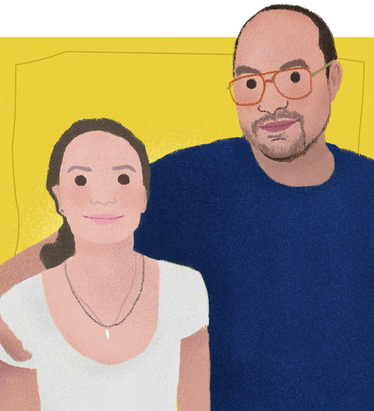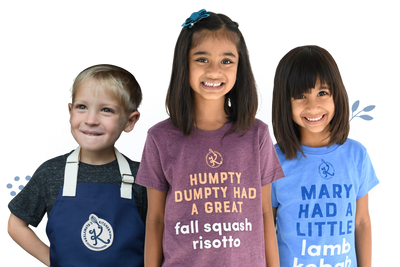
Taste Bud Profile
Fiore Tedesco

One of the most incredible things about Chef Fiore Tedesco is his ability to connect ideas and concepts across mediums. For example, the way he thinks about music, nature, art, poetry, dreams, etc. all affect the way he creates and experiences food. Little points of inspiration amplify the recreation of memories for him, such as his grandmother's meatballs, in ways that make preserve the idea but make it bigger and brighter. I won't spoil the surprise, but his message of strength for kids through the things that make us feel self-conscious is not to be missed.



Fiore Tedesco: L’Oca d’Oro is named for my daughter, Lucinda, whose nickname is Lucy Goose. It means “golden goose” in Italian. My wife and I both have jet black hair, and Lucy was born with these little tufts of curly blonde hair—so she has always been my golden goose.
In clarifying the concept for the restaurant, I explored a lot of options with tasting menus, and lots of “cheffy” things. I needed to get techniques and ideas out of my system to get back in touch with where my soul lives, with food and in the kitchen—the food that I grew up with that I feel most connected to. My food memories as a young child really resonate with me.
What I realized as an adult is that all the food ideas that I had in my tasting menus were actually inspired by things I had eaten as a child, and I decided to focus on that, and get back in touch with my Italian American roots and open the most soulful, authentic restaurant that I could.

I grew up spending a lot of time at my grandparents house in Troy, NY. Both of my grandparents were from southern Italy—my grandmother came from a long line of bakers, and my grandfather grew up in a small farming village. I’m named for him. My grandmother’s kitchen is where I wanted to spend all of my time. On Sundays we always had a huge family dinner. Often more than 20 of us were crammed elbow to elbow around a table that definitely didn’t seat 20. It’s the source of all of my most romantic food memories—and what makes me love hospitality: the way we were all packed together, laughing, fighting, teasing. eating—the whole thing, the whole feeling. Every Sunday morning, I’d wake my parents up at 5 am and shake them out of bed to take me to grandmas so I could be there when she started cooking. My grandmother used to roll the meatballs, and sauté them in olive oil before they went in to the sauce. I always wanted to be there for the first meatball that came out of the pan, before it went in to the sauce. That memory is where love lives the brightest for me—she’d slap my hand and tell me I didn’t belong in the kitchen because I was a boy, but she always waited for me, every week.
I make a version of her meatballs now that she’d probably scream at me for—but the way I think about food, I’m trying to take those memories and what I loved and amplify them. What was it about the meatball that made me crave it before it went in to the sauce? I think there was a brightness and sharpness from pecorino. So in my version, to amplify that distinct moment that I loved, I add preserved lemon and fermented and garlic. They sharpen the flavor, and the feeling that I remember. They make that memory and that dream a little bigger and brighter.
Before I cooked professionally, I played drums in punk bands for 10 years for a living. Despite growing up cooking and always having cooking jobs to fall back to, my focus at that time was on music.
Creativity flowed through me as rhythms and melodies—seeing the way a leaf blowing in the wind on a tree inspired rhythms in the music I played. Eventually I channeled that in to cooking. I was on tour in Italy, and suddenly those little bits of inspiration started to appear to me as ideas in food instead of rhythms for the first time. It started to be muddied in mind—why was I thinking about food instead of music? I just decided to trust in that feeling, and I followed it. I worked to really discipline myself, seek out the most rigorous kitchens, and gather the skills and tools I’d need to accurately translate those dreams and thoughts and see if that’s where I wanted to go. After years of focusing, and certain skills and abilities becoming muscle memory, I can think about things both ways now.
When I see whatever it is that inspires me—nature, art, poetry, a dream I had—now the colors of the palette I think in are flavors, aromas, melodies, rhythms and memories. Those things are all connected for me, but it feels like a different level of consciousness.
I was born deaf. I couldn’t hear till I was 5 years old, I couldn’t speak with any level of articulation till I was almost a teenager. I got my hearing back through a series of surgeries. Growing up disabled, there were so many challenges, but looking back I can be grateful for all of it now. The reason I’m able to articulate my visual language the way I can is because that’s the way I lived for years. I never had a verbal language to clarify my thoughts. It pushed me into a non-verbal, creative realm to push me to process and deliver all the thoughts and feelings I had. Learning how to speak after the fact, and reintegrating into social processes was extremely difficult and took me a long time, but all of these things certainly forced me to think about how and why I communicated.
We all have different things about us, especially when we’re kids, that we think are things that will hold us back, or that we’re scared of, or self-conscious of—and those are the things that turn out to be our greatest strengths.
The facets that we have to work through and work around, they inspire the most creative thinking about ourselves, and they can be body armor, but they can also end up being an olive branch to the rest of the world. They can allow us to communicate with other people in a way that might inspire them. Embrace those things that you are self conscious about. Love those things about yourself. Trust that one day you’ll be able to share them, you’ll feel wonderful about it, and you will help other people.

